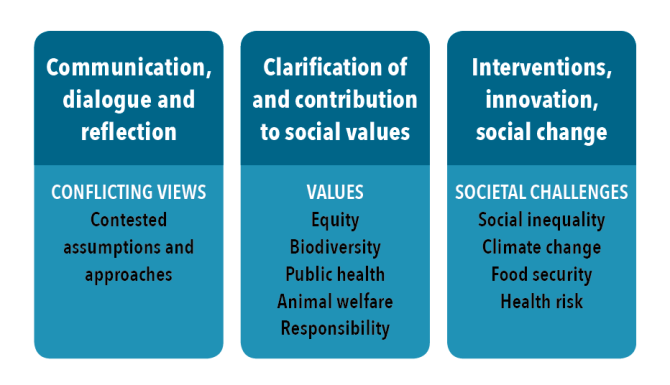
Research of CPT: doing and studying
Many of today’s societal challenges – ranging from food security to climate change, sustainability to ecology, poverty to health inequity – are characterised by deep epistemic and value conflicts.
At CPT, our mission is to develop novel conceptual and policy-relevant understandings of these conflicts as the basis for clarifying (and reconfiguring) problems and proposing innovative solutions to government, industry and civil society. In our work we connect technical/scientific responses to such problems with societal and ethical engagement and inquiry, embracing core social values such as democracy, human rights, wellbeing, and equity.
A key characteristic of our work is that it is action-oriented and reflexive. We both study societal challenges, debates and change processes and intervene in such societal processes, often together with stakeholders.
This approach of ‘doing and studying’ is directed to three central research foci: (1) communication, dialogue and reflection (we do deliberation, and we critically reflect on it at the same time); (2) social/ethical values (we pursue certain values, such as integrity, and we reflect on them), and (3) interventions, innovation and social change (we do interventions, and study the process and effects at the same time).
Research at CPT: Action-oriented and Reflexive

We distinguish three research lines each of which embrace the CPT ‘doing and studying’ approach. The three chair groups are complementary in contributing to these research lines.
Our research lines
1. Communication and Change
In our research, we focus on challenges stemming from societal pluralities and the power of com-munication to address them. These include: the contested understandings of knowledge and truth-claims, varying interactions between hazards and social context, differing perceptions of environ-mental risks and uncertainties, shifting relationships between governments and civil society and within civil society, changing trust relations with public and private-sector institutions, and the rise of societal controversy, polarisation and experiences of exclusion. Building on these understandings, we contribute to communicative interventions that seek to respond effectively, inclusively and equitably. For example, we study the potential of dialogue, upstream public engagement, storytelling and new forms of engagement, such as civic initiatives, online activism, and experiments with new democratic spaces and forms of collaboration and contestation. Key research foci include: analysing and support-ing constructive interaction between actors in different positions of power and agency; engaging with the methodological and conceptual challenges of making anticipatory knowledge; understanding and reflecting upon the origins of perceptions of and behaviours towards life science topics; studying the role of psychological and communicative insights to create transformative change.
2. Innovation and Transformation
Science and innovation are directed at solving societal and development challenges. Yet, many in-novations fail because they are technocratic, simplistic in their assumptions of how they go to scale, or unable to see how proposed solutions generate new problems and dilemmas. At CPT we develop reflexive and inclusive approaches to understand, evaluate and transform innovation processes. Much of our research takes place in the Global South, engaging with communities of practice from grass-roots actors to initiators of social innovation and sustainability transitions, studying how innovations can be supported to scale up in a responsible manner. We study and enhance reflexivity in science, responsible and inclusive innovation, the governance of innovation processes and the ‘re-configura-tion’ of societal interactions. Key research foci include: studying and supporting the alignment of so-cio-technical innovation through dialogue and co-design; researching and contributing to responsible innovations in domains such as ICT platforms, big data, digitalization and gene editing; researching motivations, drivers and barriers for responsible innovation in different sectors and epistemic com-munities; developing reflexive and inclusive approaches to innovation and transformation processes bringing together social, intercultural, organisational, commercial and technical components in trans-disciplinary research.
3. Ethical Values in Practice
In this research line, the normative dimension of our work is most explicit. We critically reflect on concepts, values, and epistemic and ontological assumptions often taken for granted in research, policy and practice in WUR domains. How should we understand ‘equity’, ‘health’, (‘animal’) ‘welfare’ or ‘safety’ in various policy contexts (e.g. food production, or infectious disease control)? What is a coherent understanding of what is ‘natural’ or ‘sustainable’ in relation to food production, biotechnol-ogy or nature development? How to evaluate new technologies that not only disrupt societal practices but also the very concepts and values that are central in our ethical frameworks? How should we un-derstand the nature of human-animal relationships under changing societal and natural conditions? How to contribute to real-life interventions that respond to the concerns of local communities in areas such as biocultural heritage, intercultural education, research governance, and social activism? How to understand the relations between different epistemic communities such as environmental scientists, Indigenous communities, policy makers, and smallholder farmers? To respond to such questions, we combine philosophical reflection, empirical philosophy, participatory philosophy and philosophy as action research to better understand ethical, epistemological and ontological questions and dilemmas and contribute to responsible policies and practices.